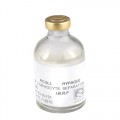Anti-inflammatory activity of intravenous
Anti-inflammatory activity of intravenous immunoglobulins protects against West Nile virus encephalitis
Ruchi Srivastava,3,† Chandran Ramakrishna,3,† and Edouard Cantincorresponding author1,2,3
Abstract
West Nile virus (WNV), an important global human pathogen, targets neurons to cause lethal encephalitis, primarily in elderly and immunocompromised patients. Currently, there are no approved therapeutic agents or vaccines to treat WNV encephalitis. Recent studies have suggested that inflammation is a major contributor to WNV encephalitis morbidity. In this study we evaluated the use of IVIG (intravenous immunoglobulins – a clinical product comprising pooled human IgG) as an anti-inflammatory treatment in a model of lethal WNV infection. We report here that IVIG and pooled human WNV convalescent sera (WNV-IVIG) inhibited development of lethal WNV encephalitis by suppressing central nervous system (CNS) infiltration by CD45high leukocytes. Pathogenic Ly6Chigh CD11b+ monocytes were the major infiltrating subset in the CNS of infected control mice, whereas IVIG profoundly reduced infiltration of these pathogenic Ly6Chigh monocytes into the CNS of infected mice. Interestingly, WNV-IVIG was more efficacious than IVIG in controlling CNS inflammation when mice were challenged with a high-dose inoculum (105 versus 104 p.f.u.) of WNV. Importantly, adsorption of WNV E-glycoprotein neutralizing antibodies did not abrogate IVIG protection, consistent with virus neutralization not being essential for IVIG protection. These findings confirmed the potent immunomodulatory activity of generic IVIG, and emphasized its potential as an effective immunotherapeutic drug for encephalitis and other virus induced inflammatory diseases.






Leave a Reply
Want to join the discussion?Feel free to contribute!